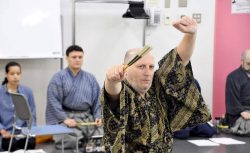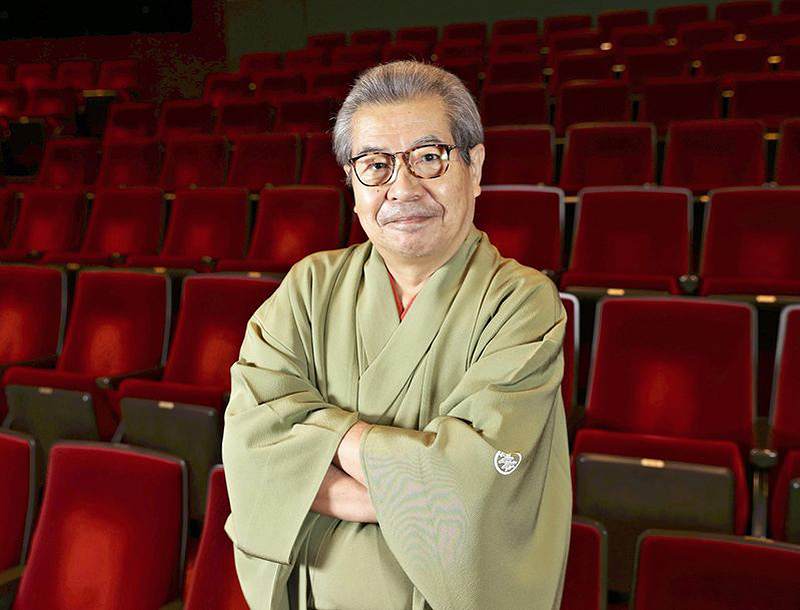
Tatekawa Shinosuke poses for a photo in the Parco Theater in Shibuya Ward, Tokyo, where he will give rakugo performance in January.
December 9, 2021
If it were not for a serendipitous encounter with a single cassette tape, the rakugo world may never have heard from one of its greatest contemporary stars.
Tatekawa Shinosuke decided to become a professional rakugo storyteller after listening to a recording of stage performances by Tatekawa Danshi (1936-2011), the famed comedic master who would go on to become his mentor.
Shinosuke was impressed by Danshi’s freewheeling style that used the artform as a platform for personal narrative.
“Danshi aimed to prolong the lifespan of rakugo storytelling and innovate the craft’s essence,” Shinosuke said. “Looking back [over my own career] now, I can only think that I was somehow called upon by Danshi to help further that goal.”
Born in Toyama Prefecture, Shinosuke became a household name as the host of “Gatten,” a popular TV program broadcast by NHK, and was awarded the Medal with Purple Ribbon in 2015.
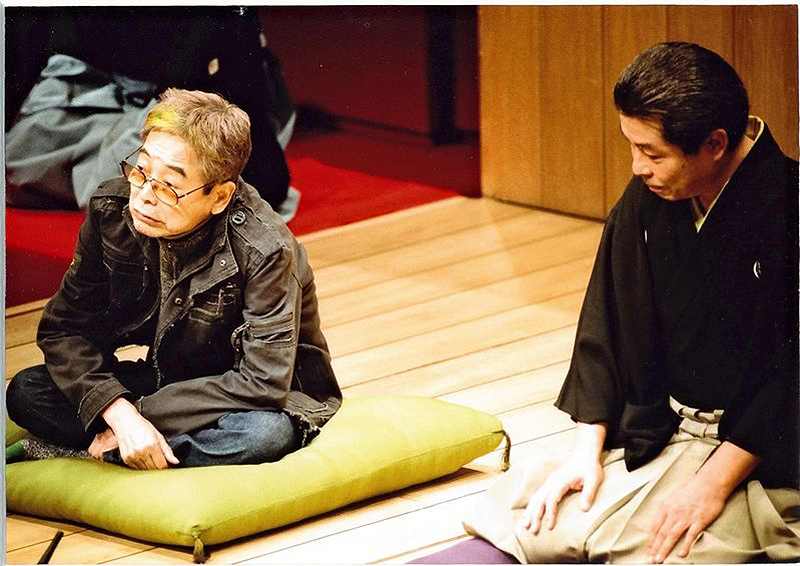
Tatekawa Danshi, left, and Shinosuke perform onstage at the Parco Theater in January 2008.
Despite these accolades, Shinosuke was a relative latecomer to the art.
An avid tennis player in his junior and senior high school years, he did not entertain even the slightest interest in rakugo until he enrolled in Meiji University at age 18.
Shinosuke recalled: “I was walking around campus when someone approached and said, ‘Follow me if you want to see something interesting.’ I was led to a group of kimono-clad students taking turns performing. It was indeed interesting, and I wanted to join.”
The group was none other than the university’s Rakugo Kenkyukai, an extracurricular student group for rakugo performance. Meiji University’s rakugo group is one of the most illustrious of its kind with a long list of alumni including TV entertainer Yuji Miyake, who was a club mate two years ahead of Shinosuke. A quick-witted Tokyoite born and raised in the capital’s Kanda district, Miyake reportedly had a way of filling any room he walked into with smiles and laughter.
“Miyake was born with pure rakugo spirit coursing through his veins,” Shinosuke said.
He admired the model set by Miyake, and before long, began devoting most of his time to honing his own rakugo chops.
“I would make a beeline straight from my boarding house to the rakugo club room, then to my part-time dishwashing gig. I hardly ever attended my university classes,” Shinosuke said sheepishly.
Shinosuke’s dedication was rewarded with the stage name “Shikontei Shiicho,” an honor passed down through generations of performers in the university’s rakugo club.
He inherited the name from Miyake to become the fifth generation Shiicho. After Shinosuke, the title passed to Masayuki Watanabe. All three would go on to enjoy successful careers in the entertainment business.
Shinosuke also fell in love with the theatrical stage. After graduating from university, he joined a Shingeki (new drama) acting school.
“Even at that time, I had still not made up my mind to become a professional rakugo storyteller. But I knew I wanted to do something expressive, so spent two years or so in the acting school,” he said.
With little hope of earning a living as an actor, Shinosuke made ends meet with part-time jobs. Around this time, he was drinking one night in a bar in Shinjuku, when the man next to him at the counter asked if he wanted to try his hand at advertising. As a result of the spontaneous encounter, Shinosuke became a salaryman at an ad agency. “I ended up working there for nearly four years.”
At the agency, Shinosuke handled the production of commercials, and through his work had to make an extended stay in Kanazawa. It was during this Kanazawa sojourn that he happened to listen to the cassette recording of Danshi’s performance. “I still don’t know why I had that tape or where it came from,” Shinosuke said.
He listened to the 90-minute-long recording over and over again each night until the tape frayed.
“I memorized the stories to the point that I could perfectly mimic the performance with the same inflection,” Shinosuke said.
Danshi’s masterstroke
Shinosuke decided to return to Tokyo. He visited Danshi’s home in the hopes of becoming his disciple.
At the time, Shinosuke was going on 29 and already married. It was by all counts a late start for a career as a rakugo storyteller, but he was determined.
“People from Toyama are a diligent bunch. I had always felt that I would have to decide upon a career by the time I turned 30,” he said.
The timing would prove to be pivotal. A mere six months after joining the Tatekawa school, Danshi broke with the Rakugo Kyokai, a professional association of mainstream rakugo storytellers, and established his own group.
The move would set Shinosuke on a completely different course from other fledgling storytellers, who typically begin their careers as a zenza curtain-raiser in yose theaters.
Danshi encouraged Shinosuke to perform in a diverse range of settings. “You are the first test in my experiment,” the master reportedly said. “Go out and prove that you can be successful as a rakugo storyteller. Do all sorts of jobs and become famous.”
“I tried out many things as experiments, eager to please Danshi and earn his recognition,” Shinosuke recalled.
Breaking the mold of rakugo performances, these experiments included talk events held in a small theater in the Shimokitazawa area in Tokyo every week, and one-man shows in which audience members left with specialty goods from Toyama Prefecture as souvenirs.
He came to understand that what delighted Danshi also aligned with what modern audiences craved.
“I am able to draw on past experiences in the ad agency and acting school to perform a style of rakugo that is totally different from everyone else,” he said. “Good or bad aside, I’ve been able to develop this style because I experienced other jobs.”
The rakugo hierarchy consists of three ranks. After being promoted to “futatsume,” the second tier, Shinosuke became widely known through his appearances on TV and radio programs. A mere seven years since becoming Danshi’s disciple, he was with much fanfare made a full-fledged “shinuchi” master in his own right.
This led Danshi to praise Shinosuke as “the crowning achievement of the Tatekawa school.”
“Conversely, I think any accomplishments are thanks to Danshi’s push to make me strive for more.”
Even today, Shinosuke said he can still clearly picture Danshi’s face whenever he shuts his eyes and asks, “What would Danshi say in this situation?”
Top Articles in Culture
-

BTS to Hold Comeback Concert in Seoul on March 21; Popular Boy Band Releases New Album to Signal Return
-
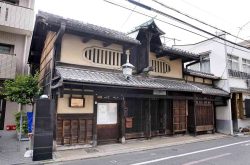
Lifestyle at Kyoto Traditional Machiya Townhouse to Be Showcased in Documentary
-

Director Naomi Kawase’s New Film Explores Heart Transplants in Japan, Production Involved Real Patients, Families
-

‘Jujutsu Kaisen’ Voice Actor Junya Enoki Discusses Rapid Action Scenes in Season 3, Airing Now
-
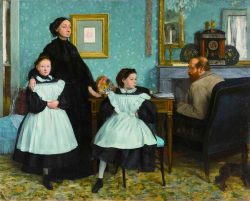
Tokyo Exhibition Offers Inside Look at Impressionism; 70 of 100 Works on ‘Interiors’ by Monet, Others on Loan from Paris
JN ACCESS RANKING
-

Japan PM Takaichi’s Cabinet Resigns en Masse
-

Japan Institute to Use Domestic Commercial Optical Lattice Clock to Set Japan Standard Time
-

Israeli Ambassador to Japan Speaks about Japan’s Role in the Reconstruction of Gaza
-

Man Infected with Measles Reportedly Dined at Restaurant in Tokyo Station
-

Videos Plagiarized, Reposted with False Subtitles Claiming ‘Ryukyu Belongs to China’; Anti-China False Information Also Posted in Japan




